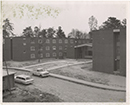




James Ferguson was installed as Chancellor of the University.
The School of Nursing was established.
Ernestine B. Small joined the School of Nursing, becoming the first African-American member of the teaching faculty at UNCG.
Taylor Theatre opened, and was named for William Raymond Taylor, a member of the faculty from 1921-1961. Taylor is sometimes referred to as the "Father of Drama" in regards to the University's theatre and drama program.
Cone Residence Hall opened, and was named for Laura Weill Cone, a member of the Class of 1910 and author of the College Song.
Phillips-Hawkins Residence Hall opened. In 1968, it was named for Charles Wiley Phillips and Kathleen Petit Hawkins. Phillips was director of Public Relations from 1935-1962, and Hawkins held various positions on campus for over 45 years - most notably in the Student Financial Aid Office. Phillips was the first men's dormitory on campus.
Carmichael Building opened and was named for William D. Carmichael, Jr., who held various offices in the Consolidated University for more than 20 years and was a guiding force in the establishment of WUNC-TV.
The Commercial Department and one-year Commercial Program were discontinued.
Elisabeth Bowles, a member of the Class of 1950, published A Good Beginning: The First Four Decades of The University of North Carolina at Greensboro.
Enrollment exceeded 5,000 for the first time, with 5,365 students enrolled for the 1967/68 school year.
William L. Burnett was the first male student to receive a PhD degree.
The Student Government Association (SGA) sponsored a series of forums on black power, community involvement, student drug use, the Vietnam conflict, and urban unrest.
The men's athletic teams adopted the name "Spartans."
The men's basketball team played their first home game.
The grassy embankment in front of Brown Building became known as "Hippie Hill" when counter-culture followers began gathering there.


























